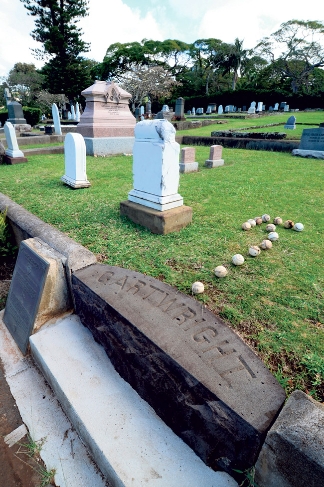The Father Of Baseball’s Birthday
For our readers who love both baseball and local history, the month of April is an especially interesting time.
April 17 is the birthdate of the so-called “Father of Baseball,” Alexander Joy Cartwright Jr., the man who is credited with writing down the rules of the modern game, including the shape of the diamond and the use of nine players in the field, three strikes and you’re out and three outs to an inning. Cartwright, who went on to become Honolulu’s first fire chief and a financial adviser to the Hawaii’s royalty (Queen’s Hospital would not have been built without his help), is buried at Oahu Cemetery.
At 11 a.m. Wednesday, April 17, you’re invited to Cartwright’s gravestone off Nuuanu Avenue to join sportscasters, sportswriters and local baseball/history buffs to honor the man who spread the word of baseball across the American continent and onto the Islands, and celebrate his 193rd birthday. There will be photo displays and a couple of short talks, including a short history of Cartwright by former Star Bulletin sportswriter Lyle Nelson and a tie-in to Rainbow baseball history from play-by-play announcer Don Robbs.
Cartwright’s place in baseball’s Hall of Fame is well known, but what might be little known is how his ties with Hawaii were honored on one of MLB’s most historic dates. According to Baseball-Reference.com, “August 26, 1939, was declared Alexander Cartwright Day throughout Major League Baseball. Hawaiian-themed celebrations were put on in all ballparks. The main focus was Ebbets Field in Brooklyn, N.Y., where Hawaii official William McGonagle made a speech about Cartwright’s accomplishments between the two games of a doubleheader, while lei and pineapple juice were offered to players from both teams. The date made history for other reasons, as well, as the first game of the doubleheader (between Cincinnati and Brooklyn) was the first MLB game to ever be shown on television, courtesy of NBC’s experimental station W2XBS.”
Friday, April 12, will mark the opening of the much-anticipated Jackie Robinson film, 42. Baseball fans know that’s the number worn by Robinson when he broke Major League Baseball’s color barrier April 15, 1947. 42 tells the story of Robinson’s relationship with Brooklyn Dodgers owner Branch Rickey (played by Harrison Ford).
I’ve written a couple of columns about Robinson’s time in the Islands. As a 22-year-old All-American football player from UCLA, he earned his first professional athlete paychecks here, garnering $100 a game for the semi-pro Honolulu Bears in the fall of 1941. The Bears were a racially integrated team during an era when that was still several years away on the Mainland, although Robinson had to stay at Palama Settlement or in an apartment in Kaimuki because most Waikiki hotels still practiced segregation at the time.
Robinson was a celebrity upon his arrival. Headlines in the local newspapers dubbed him the “Century Express,” and more than 20,000 fans turned out to watch his first regular season game at Honolulu Stadium. Robinson played quarterback, halfback, defensive back and punt returner. “Robinson, almost entirely on his own, reeled off some brilliant runs,” gushed a newspaper account of the game.
Robinson’s final game in Honolulu was played Wednesday night, Dec. 3, 1941. He left the Islands two days later on the SS Lurline, and found out while at sea that the Japanese had attacked Pearl Harbor Dec. 7. He was drafted into the Army in 1942 and served two years in the service (but not in Hawaii) before his life turned in its historic direction after the war.
Just some tidbits of history to think about while perusing your daily dose of Major League Baseball standings during the opening days of the season.






